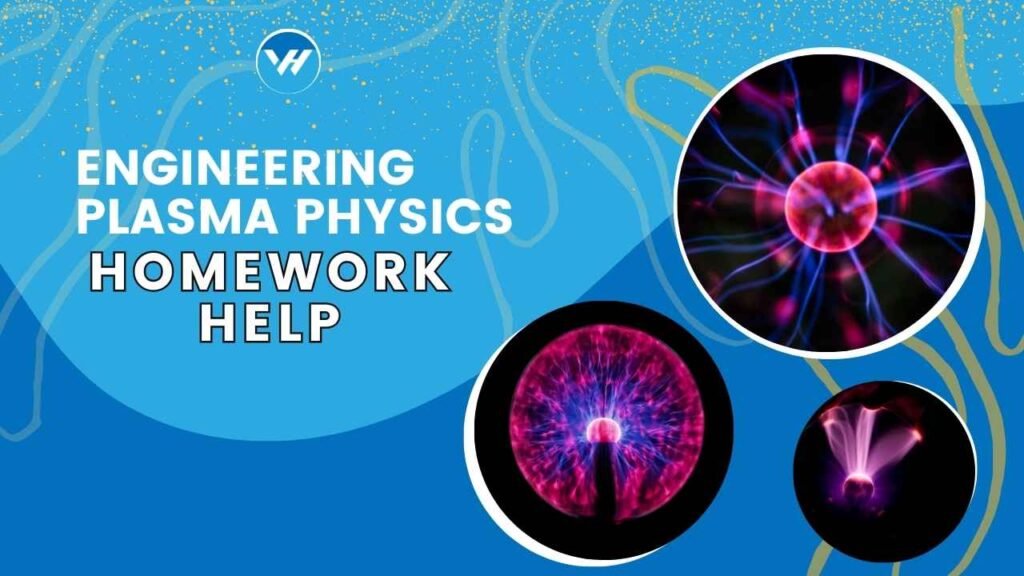When diving into the world of plasma physics, many students find themselves grappling with its complex concepts and mathematical intricacies. If you’re struggling with your plasma physics homework, you’re not alone. Plasma physics, a field that explores the behavior of ionized gases, is a fascinating but challenging subject. This article will guide you through understanding plasma physics, offer strategies for tackling homework, and introduce you to Virtual Help, an excellent resource for academic assistance.

Table of Contents
ToggleWhat is Plasma Physics?
Plasma physics is the study of plasmas, which are often referred to as the fourth state of matter. Unlike solids, liquids, and gases, plasmas are ionized gases with charged particles. This state of matter occurs naturally in stars, including our sun, and has various applications in technology and engineering.
Why is Plasma Physics Important in Engineering?
In engineering, plasma physics is crucial for developing technologies like plasma arc welding, semiconductor fabrication, and space propulsion systems. Understanding plasma behavior helps engineers design more efficient systems and solve complex problems related to high-energy environments.
Common Challenges in Plasma Physics Homework
Students often find plasma physics challenging due to its abstract concepts and heavy reliance on mathematics. Common difficulties include understanding plasma behavior, applying complex equations, and interpreting experimental data.
Understanding Plasma Physics
Basics of Plasma Physics
At its core, plasma physics involves studying ionized gases where electrons are separated from their nuclei. This results in a mixture of free electrons and positively charged ions. Plasma behaves differently from other states of matter, exhibiting unique properties like electrical conductivity and magnetic field interactions.
Key Concepts in Plasma Physics
Plasma State of Matter
Unlike ordinary gases, plasmas are highly conductive and responsive to electromagnetic fields. This makes them essential in various high-tech applications, from plasma TVs to fusion reactors.
Plasma Behavior and Characteristics
Plasmas can exhibit collective behavior, such as wave propagation and turbulence, which are critical in understanding phenomena like space weather and fusion reactions.
Applications of Plasma Physics in Engineering
Plasma physics is not just theoretical; it has practical applications in engineering. For example, in aerospace engineering, understanding plasma interactions helps in designing better thermal protection systems for spacecraft re-entering the Earth’s atmosphere.
How to Approach Plasma Physics Homework
Breaking Down Plasma Physics Problems
Start by carefully reading each problem and identifying the key concepts involved. Break complex problems into smaller, manageable steps to tackle them more effectively.
Using Formulas and Equations in Plasma Physics
Plasma physics problems often require specific formulas and equations. Familiarize yourself with these equations and practice applying them to different scenarios. Don’t forget to double-check your calculations for accuracy.
Common Mistakes and How to Avoid Them
A common mistake is misinterpreting the problem or applying the wrong formula. To avoid these pitfalls, ensure you understand each problem’s requirements and verify your solutions step by step.
Resources for Plasma Physics Homework
Online Tutoring Services
Benefits of Online Tutoring
Online tutoring offers personalized help and flexible scheduling. Tutors can provide one-on-one assistance, which is invaluable for understanding complex plasma physics concepts.
Choosing the Right Tutor
Look for tutors with expertise in plasma physics and strong teaching skills. Reviews and recommendations can help you find a tutor who matches your learning style.
Educational Websites and Tools
Interactive Simulations and Calculators
Several educational websites offer interactive simulations and calculators to visualize plasma behavior and solve equations. These tools can enhance your understanding and provide practical experience.
Recommended Textbooks and Articles
Consulting textbooks and scholarly articles can provide in-depth knowledge and additional examples. Recommended texts include “Introduction to Plasma Physics and Controlled Fusion” by Francis Chen and “Plasma Physics and Fusion Energy” by Jeffrey P. Phelps.
Virtual Help: Your Solution for Plasma Physics Homework
What is Virtual Help?
Virtual Help is an innovative platform designed to connect students with expert tutors for personalized academic assistance. Available on iOS and Android, the app offers a convenient way to get help with challenging subjects like plasma physics.
Features of Virtual Help
Virtual Help provides access to a wide range of tutors, interactive tools, and resources. Features include real-time tutoring, homework assistance, and detailed explanations tailored to your needs.
How Virtual Help Can Assist with Plasma Physics Homework
By using Virtual Help, you can receive tailored guidance on your plasma physics assignments. Tutors can help you understand difficult concepts, solve problems, and provide insights into real-world applications.
Tips for Success in Plasma Physics Homework
Time Management and Study Techniques
Effective time management is crucial for tackling plasma physics homework. Set aside regular study sessions and use techniques like active recall and spaced repetition to reinforce your understanding.
Seeking Clarification and Asking Questions
Don’t hesitate to ask questions if you’re stuck. Seeking clarification from tutors, professors, or peers can help you overcome obstacles and improve your grasp of the material.
Collaborating with Peers
Studying with classmates can provide additional perspectives and insights. Collaborating on homework can help you understand different approaches and solve problems more effectively.
Conclusion
Plasma physics, with its intricate concepts and applications, can be a daunting subject for many students. However, with the right resources and strategies, you can navigate your homework successfully. Platforms like Virtual Help offer valuable support, connecting you with experienced tutors and interactive tools to enhance your learning experience. Embrace these resources and techniques, and you’ll find yourself mastering plasma physics in no time.
FAQs
What is plasma physics?
Plasma physics is the study of ionized gases, known as plasmas, which are a distinct state of matter characterized by free electrons and ions. It explores their behavior, properties, and applications in various fields.
How can online tutoring help with plasma physics homework?
Online tutoring provides personalized assistance, helping you understand complex concepts, solve problems, and improve your skills. Tutors can offer tailored explanations and support that fits your learning needs.
What are some common challenges in plasma physics homework?
Common challenges include understanding abstract concepts, applying complex equations, and interpreting experimental data. Breaking problems into smaller steps and practicing regularly can help overcome these difficulties.
How can Virtual Help assist with my plasma physics assignments?
Virtual Help connects you with expert tutors who can provide personalized guidance, explanations, and problem-solving assistance for your plasma physics assignments. The platform also offers interactive tools and resources to aid your studies.
Where can I find additional resources for studying plasma physics?
Additional resources include educational websites with simulations and calculators, recommended textbooks like “Introduction to Plasma Physics and Controlled Fusion,” and scholarly articles for in-depth understanding.





